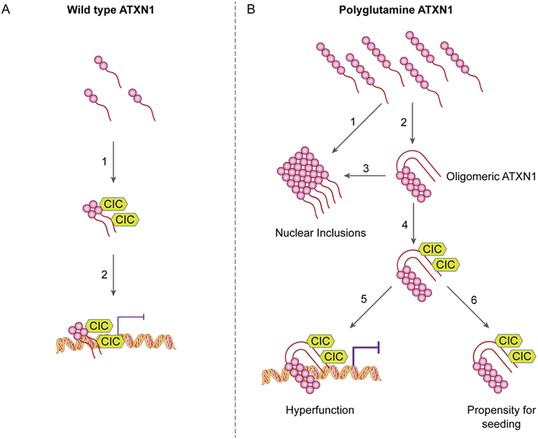This post is technical in nature so I hope the non-technical folk will forgive me.
If you are new to this site or to my posts, let me start by saying that I have SCA1 but have managed to keep my symptoms at bay. I believe I am doing so with a simple combination of diet, exercise, and carefully chosen supplements. For more information about what I am doing look here: healthunlocked.com/ataxia-u...
Now today's post is a discussion about a scientific aspect of the research surrounding ways to treat polyQ disorders as well as other neurodegenerative diseases like Alzheimer's, Parkinson's, and Huntington's.
For several years now, I have come to the conclusion that what all these diseases share in common is the presence of proteins in the brain that somehow become toxic. In scienctific terms, all the proteins in question are able to form oligomers. What that means is that for different molecular reasons these proteins all fail to attach to other molecules in the brain in a proper fashion and end up not getting removed from the brain at the proper time, a process called autophagy. It is the combination of these two scientific processes that underly my theory on the supplements I chose. It turns out there are molecules in nature that have a natural affinity to both stop toxic proteins from forming oligomers and help the body perform autophagy or in other words the natural molecules stop the toxic proteins from clumping and sticking around longer than needed.
What is critical to understand in this discussion is that delivering small molecule proteins to the brain capable of preventing oligomerization and enhancing autophagy is WAY WAY WAY simpler than trying to repair DNA, and until recently researchers have all been focused on repairing DNA rather than simple protein clearing, BUT it looks like top researchers are starting to pay attention. Here are 3 quotes from recent papers:
"These conclusions highlight the importance of studying both the loss and the gain of function of aggregation-prone disease-driving genes, particularly in the context of their native complexes. Our studies suggest that disrupting the ATXN1-CIC interaction, either pharmacologically or with a small peptide, will bear fruit for the ataxia in SCA1."
-
ncbi.nlm.nih.gov/pmc/articl...
-
"Our findings for SCA1 are likely to be applicable to other members of the larger family of neurodegenerative proteinopathies. It should be worthwhile, for example, to explore whether native interactors of tau and α-synuclein might promote or hinder their formation of toxic oligomers. Without ruling out the role of non-native interactors in protein aggregation, we propose that neuropathological features of a specific disease are determined by both transient and stable native protein interactions and that these interactions in turn affect the amyloidogenic properties of the disease-associated protein. Thus, blocking certain interactions that mediate the formation or stabilization of oligomeric toxic entities, or modulating the downstream effects of such interactions, could be an attractive treatment option for this class of diseases."
-
ncbi.nlm.nih.gov/pmc/articl...
-
"Future efforts are required to understand which structures within the A11 epitope facilitate 20S proteasome binding and impairment and if this phenomenon occurs in human disease conditions. Elucidation of this mechanism provides a compelling model to explain why proteasome function has been found to be impaired in virtually all neurodegenerative diseases. Interestingly, Choi et al.77 showed that opening of the 20S proteasome gate in cells leads to enhanced cellular proteasome function, including ubiquitin-dependent protein degradation, decreased protein aggregates, and protection from oxidative stress. Our model provides a mechanistic framework to develop small molecules to counteract proteasome impairment via A11+ oligomers. Illustrating this potential mechanism of proteasome impairment identifies novel drug targets for developing small molecule activators of the proteasome gate. Such therapeutic interventions have the potential to restore proteostasis in patients suffering from neurodegenerative diseases."
ncbi.nlm.nih.gov/pubmed/295...
ncbi.nlm.nih.gov/pubmed/244...
Alright Joe that's all well and good, but what does this MEAN?
It means scientists are coming to the conclusion that the best way to treat SCA may be with small molecules and that is exactly what the supplements in my regimen have evidence they MAY be helpful in doing. So . . . we all need to drink more Green Tea with trehalose 
Joe in NY

